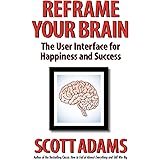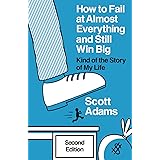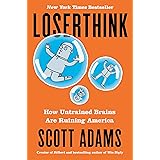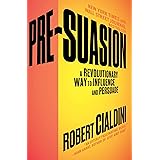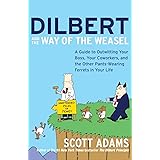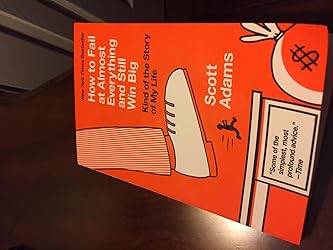
Download the free Kindle app and start reading Kindle books instantly on your smartphone, tablet, or computer - no Kindle device required.
Read instantly on your browser with Kindle for Web.
Using your mobile phone camera - scan the code below and download the Kindle app.

OK
How to Fail at Almost Everything and Still Win Big MP3 CD – MP3 Audio, April 8, 2014
Scott Adams has likely failed at more things than anyone you’ve ever met or anyone you’ve even heard of. So how did he go from hapless office worker and serial failure to the creator of Dilbert, one of the world’s most famous syndicated comic strips, in just a few years? In How to Fail at Almost Everything and Still Win Big, Adams shares the strategy he has used since he was a teen to invite failure in, to embrace it, then pick its pocket.
No career guide can offer advice for success that works for everyone. As Adams explains, your best bet is to study the ways of others who made it big and try to glean some tricks and strategies that make sense for you. Adams pulls back the covers on his own unusual life and shares what he learned for turning one failure after another into something good and lasting.
Adams reveals that he failed at just about everything he’s tried, including his corporate career, his inventions, his investments, and his two restaurants. But there’s a lot to learn from his personal story, and a lot of humor along the way. While it’s hard for anyone to recover from a personal or professional failure, Adams discovered some unlikely truths that helped to propel him forward. For instance:
• Goals are for losers. Systems are for winners.
• “Passion” is bull. What you need is personal energy.
• A combination of mediocre skills can make you surprisingly valuable.
• You can manage your odds in a way that makes you look lucky to others.
You won’t find a road map to success in this audiobook. But Adams hopes you can laugh at his failures while discovering some unique and helpful ideas on your own path to personal victory. As he writes:
“This is a story of one person’s unlikely success within the context of scores of embarrassing failures. Was my eventual success primarily a result of talent, luck, hard work, or an accidental just-right balance of each? All I know for sure is that I pursued a conscious strategy of managing my opportunities in a way that would make it easier for luck to find me.”
- LanguageEnglish
- PublisherBrilliance Audio
- Publication dateApril 8, 2014
- Dimensions6.5 x 0.63 x 5.5 inches
- ISBN-101491518855
- ISBN-13978-1491518854
The Amazon Book Review
Book recommendations, author interviews, editors' picks, and more. Read it now.
Similar items that may ship from close to you
Product details
- Publisher : Brilliance Audio; Unabridged edition (April 8, 2014)
- Language : English
- ISBN-10 : 1491518855
- ISBN-13 : 978-1491518854
- Item Weight : 3.5 ounces
- Dimensions : 6.5 x 0.63 x 5.5 inches
- Best Sellers Rank: #3,753,278 in Books (See Top 100 in Books)
- #9,869 in Job Hunting & Career Guides
- #25,523 in Books on CD
- Customer Reviews:
About the authors

What started as a doodle has turned Scott Adams into a superstar of the cartoon world. Dilbert debuted on the comics page in 1989 while Adams was in the tech department at Pacific Bell. Adams continued to work at Pacific Bell until he was voluntarily downsized in 1995. He has lived in the San Francisco Bay area since 1979.

Scott Adams is the creator of the Dilbert comic strip that is published daily in thousands of newspapers and websites all over the world. Adams also authored several non-Dilbert books as well. He is co-founder of Whenhub.
Dilbert comics: Dilbert.com
WhenHub: WhenHub.com
Customer reviews
Customer Reviews, including Product Star Ratings help customers to learn more about the product and decide whether it is the right product for them.
To calculate the overall star rating and percentage breakdown by star, we don’t use a simple average. Instead, our system considers things like how recent a review is and if the reviewer bought the item on Amazon. It also analyzed reviews to verify trustworthiness.
Learn more how customers reviews work on AmazonReviews with images
-
Top reviews
Top reviews from the United States
There was a problem filtering reviews right now. Please try again later.
Tongue in cheek title but quite a fresh, enlightening book that actually is more aptly described as 'How to Think towards and about Success'. This is a book of opinions. That make good sense. Nothing earth shattering but rarely is anything that is simultaneously difficult and easy to do novel or original. Jim Rohn used to explain that behaviors that are conducive to the path toward success are easy to do but also easy not to do. The value in Adam's thoughts come in the form of offering his experiences and methods in his own life on making it easier to do the right behaviors, and thus making it easier for him and us to choose the successful habits. Adam's book offers his macro view of what allows for success, what greases the wheels for success. And how not to get hung up on popular concepts like "passion". Great short chapter on the fallacy behind being fed advice to "follow your passion" which Adams reasons can be detrimentally misleading. In short, readers will be better off simply reading this single chapter and understanding Adam's explanation that success is more a factor in causing passion than passion is in causing success and that energy is good but the concept of passion can be bullcrap, as Adams says.
I don't mind reading opinionated thoughts because I am sufficiently confident that I can ferret out what I need and want from them without getting hung up on them. (There are some weird opinions on hypnosis and notion of humans as holograms in a computer software program that were wasted on me...but it's all good; I still like the book....) I very much liked Adam's "How to Fail at Almost Everything" precisely because he didn't strain over proving his logic or overwhelm us with justifications for his methods. He shares with us his thoughts: he shares a simplified extract of his personal thought processes and offers them as an example of how such might facilitate our own path toward our ideas of success. Adams offers patterns he's observed in his life that can prove useful and ways to think of concepts that are more practical over popular alternatives that tend to weigh us down with intricate methodical scientifically proven plans that may not be easy to sustain in the long-run.
There are some core, foundational aspects in our lives that Adams lays out that need attention in order for us to find our success. Adams believes that you need to tend to the groundwork for success by tending to your mind and body so as to allow yourself and your own set of talents and strengths to surface and flourish. Success is not easy but it's achievable...for anyone. Adams provides a set of skills and areas of knowledge towards which he thinks we should all vow a lifetime commitment to honing, learning and mastering. These make up a manageable and sensible list that will help in dealing with life and other people.
There are a lot of great thoughts packed into this book, little nuggets here and there that you really must extract for yourself because your nuggets will undoubtedly differ from mine. My personal favorite system-based concepts include the following, all of which cannot be adequately expressed through such a list without reading Adam's presentation of them:
1. "If you believe people use reason for the important decisions in life, you will go through life feeling confused and frustrated that others seem to have bad reasoning skills." So damn true, Mr. Adams.
2. Success/Passion fallacy of thinking. It's all comes down to your personal energy.
3. Simplify your systems, thus simplifying your life.
4. Good ideas have no value - it's all about execution, Baby.
5. Always be looking for your next better job options as soon as you get your current job.
6. Appearance matters (don't shrug...common sense yet not common)
7. Systems are ongoing; it doesn't matter if you can't tell their components are moving you towards the right direction on a daily basis.
8. Wishing is for losers. Decide to pay the price and then pay it.
9. Manage your illusions wisely and you might get what you want even if you don't understand why or how it worked.
10. Careful who you surround yourself with.
11. Everyone "is a basket case on the inside."
12. "If you do selfishness right, you automatically become a net benefit to society."
Of course, a great deal of hokum and P.T. Barnum-like salesmanship pervades the field as well. From Norman Vincent Peale to Dale Carnegie to Napoleon Hill to Stephen Covey, we find a middle-brow sources of advice, often over-sold or simplistic, but good for nuggets of wisdom and for exercising the crap-detector. Some writers have helpful suggestions for improving morning rituals, getting more work done, and becoming a better conversation partner. Nassim Nicolas Taleb provides a good contemporary example of an intellectual who dispenses advice and opinions, not under the guise of self-help, but through thoughtful and entertaining essays that provide can provide benefits. One has to shop carefully, or you end up with a bunch of sale junk in your reading basket, but if you’re discerning, you can provide yourself (it’s who your giving a gift to, right?) some helpful mind-stuff.
This brings me to Scott Adams. Farnum Street (one my must-read blog list) posted an excerpt and commentary based on Adams’s combination autobiography and self-help book. In fact, the unique blend of personal story and insight into how to conduct a better life makes this a fun read. I’ve never read Dilbert cartoons regularly—Adams’s significant claim to fame—so I wouldn’t have read the book unless Farnum Street had included a blurb about how Adams denigrates “goals” and promotes “systems”. My inner Taoist had rebelled against goals in a way that I had never been able to quite understand. I’ve accomplished things in life, helped raise a family, succeeded in my profession, married well, and so on, without having been a goal-driven person. In fact, I had this inkling that goals were a rather abstract and perhaps in some way faulty way of going about things, and Adams clarified the issue for me. Adams writes:
To put it bluntly, goals are for losers. That’s literally true most of the time. For example, if your goal is to lose ten pounds, you will spend every moment until you reach the goal— if you reach it at all— feeling as if you were short of your goal. In other words, goal-oriented people exist in a state of nearly continuous failure that they hope will be temporary. That feeling wears on you. In time, it becomes heavy and uncomfortable. It might even drive you out of the game. If you achieve your goal, you celebrate and feel terrific, but only until you realize you just lost the thing that gave you purpose and direction. Your options are to feel empty and useless, perhaps enjoying the spoils of your success until they bore you, or set new goals and reenter the cycle of permanent presuccess failure.
Adams, Scott (2013-10-22). How to Fail at Almost Everything and Still Win Big: Kind of the Story of My Life (p. 32). Penguin Books Ltd. Kindle Edition.
If you have your crap-detector on, you will think that any system as a system must have a goal or purpose, and that any goal must have a means or system for reaching the goal. Adams agrees. He recognizes the inherent relation of goals and systems, but he goes on the identify the fundamental differences in perspective between the two attitudes:
[T]hinking of goals and systems as very different concepts has power. Goal-oriented people exist in a state of continuous presuccess failure at best, and permanent failure at worst if things never work out. Systems people succeed every time they apply their systems, in the sense that they did what they intended to do. The goals people are fighting the feeling of discouragement at each turn. The systems people are feeling good every time they apply their system. That’s a big difference in terms of maintaining your personal energy in the right direction. . . . For our purposes, let’s say a goal is a specific objective that you either achieve or don’t sometime in the future. A system is something you do on a regular basis that increases your odds of happiness in the long run. If you do something every day, it’s a system. If you’re waiting to achieve it someday in the future, it’s a goal.
Adams, Scott (2013-10-22). How to Fail at Almost Everything and Still Win Big: Kind of the Story of My Life (pp. 32-33). Penguin Books Ltd. Kindle Edition.
This is the gem that convinced me to read the book. I think that Adams is on to something. If my goal is to lose 20 pounds, I can do it and then what? If I’m like most people, I’ll put it right back on. But if my system is to eat smartly and keep myself healthy and fit, then that’s a daily set of tasks that allow to act (with success) each day. However, lest you think he goes to far, much later in the book Adams writes:
Humans will always think in terms of goals. Our brains are wired that way. But goals make sense only if you also have a system that moves you in the right direction.
Adams, Scott (2013-10-22). How to Fail at Almost Everything and Still Win Big: Kind of the Story of My Life (p. 228). Penguin Books Ltd. Kindle Edition.
Adams throughout the book proves himself a balanced and nuanced thinker, as well as displaying a fun sense of humor.
As befits a cartoonist—who must get a message across in a small set of boxes with a few drawings and words—Adams praises the benefits of simplification, even at the expense of optimization. For him, the best way of doing things is usually the simplest because it is the most robust. (Although he doesn’t cite Nassim Taleb here, his reasoning tracks a key argument of Taleb about robustness and antifragility.) Adams goes on to list a number of different practices, acquisitions, and hacks to put yourself in the best way in this world. His list includes:
Goals are for losers.
Your mind isn’t magic.
It’s a moist computer you can program.
The most important metric to track is your personal energy.
Every skill you acquire doubles your odds of success.
Happiness is health plus freedom.
Luck can be managed, sort of.
Conquer shyness by being a huge phony (in a good way).
Fitness is the lever that moves the world.
Simplicity transforms ordinary into amazing.
Adams, Scott (2013-10-22). How to Fail at Almost Everything and Still Win Big: Kind of the Story of My Life (p. 3). Penguin Books Ltd. Kindle Edition.
Adams details these fundamentals in the course of the book. As with the biggest points, his tips and practices usually make a lot of sense. On diet, I don’t agree completely—although he’s all over the simple carb problem. However, I’m not sure that any two people on planet Earth agree about diet (where personal bias and taste account for a great deal!). Also, if you follow through to the end the book you find that Adams believes in experimentation and observation: he’s in the pragmatic camp for dealing with the world. This attitude allowed him to locate a unique and crucial cure to a severe voice impairment that he developed. It also led him to recommend affirmations as a way of realizing goals (did he just use that word or was that me?). In other words, he’s dealt with some vexing and troubling issue,s as well as the day-to-day hassles and challenges of life that we’ve all encountered, and he’s enjoyed some success. He’s allowed observation and experience to overcome skepticism, as in his use of affirmations. I appreciate someone who is that open-minded. Sometimes things work in ways we just don’t understand or that don’t make sense to us. But working knowledge can—and should—come before theory.
If you read one contemporary self-help book this year (sorry, he can’t go ahead of the Greeks, the Romans, or the earlier Americans) and you want some chuckles to go along with many helpful suggestions and insights, then I recommend this book. And, as one final gem, I’ll leave you with Adams’s own recap of his happiness formula:
Eat right.
Exercise.
Get enough sleep.
Imagine an incredible future (even if you don’t believe it).
Work toward a flexible schedule.
Do things you can steadily improve at.
Help others (if you’ve already helped yourself).
Reduce daily decisions to routine.
Adams, Scott (2013-10-22). How to Fail at Almost Everything and Still Win Big: Kind of the Story of My Life (pp. 178-179). Penguin Books Ltd. Kindle Edition.
Top reviews from other countries
Insights on life and the workplace.
A very humourous book.
Bad written, not funny, not interesting, egocentric, going from nothing to nowhere…
I gave up! Sad that I can’t return it…
Don’t waste your time and your money.
Offre lezioni e consigli utili su un numero vastissimo di temi. Dalla finanza personale a trucchi per diventare bravi conversatori.
Elenca inoltre una serie di abilità che dovremmo sviluppare per avere maggiori probabilità di successo nella vita.
Ti carica e lo fa per bene.
E' stato il primo libro di lingua Inglese che abbia comprato. Normalmente avrei evitato, ma in questo caso mi sono fatto trascinare dall'eccitazione perchè l'ha consigliato una persona che stimo molto.
Il libro è scritto in un Inglese molto semplice e accessibile. Chiaramente qualche parola non la si conosce, ma di solito sono parole molto specifiche che, anche se sconosciute, permettono comunque di capire il senso del discorso. Io l'ho letto con un dizionario vicino e/o un portatile connesso al traduttore online reverso davanti. Le parole che non conoscevo le facevo passare per il traduttore e ascoltavo la pronuncia. Alla fine il registro di parole è sempre quello, come noi possiamo avere le nostre dieci parole difficili che usiamo spesso, anche l'autore non è diverso.
Se fate come me e leggete ad alta voce il libro può anche migliorare la vostra pronuncia.
Quanto è bello imparare e migliorarsi!
Reviewed in Italy on August 4, 2020
Offre lezioni e consigli utili su un numero vastissimo di temi. Dalla finanza personale a trucchi per diventare bravi conversatori.
Elenca inoltre una serie di abilità che dovremmo sviluppare per avere maggiori probabilità di successo nella vita.
Ti carica e lo fa per bene.
E' stato il primo libro di lingua Inglese che abbia comprato. Normalmente avrei evitato, ma in questo caso mi sono fatto trascinare dall'eccitazione perchè l'ha consigliato una persona che stimo molto.
Il libro è scritto in un Inglese molto semplice e accessibile. Chiaramente qualche parola non la si conosce, ma di solito sono parole molto specifiche che, anche se sconosciute, permettono comunque di capire il senso del discorso. Io l'ho letto con un dizionario vicino e/o un portatile connesso al traduttore online reverso davanti. Le parole che non conoscevo le facevo passare per il traduttore e ascoltavo la pronuncia. Alla fine il registro di parole è sempre quello, come noi possiamo avere le nostre dieci parole difficili che usiamo spesso, anche l'autore non è diverso.
Se fate come me e leggete ad alta voce il libro può anche migliorare la vostra pronuncia.
Quanto è bello imparare e migliorarsi!

Scott Adams nimmt diesbezüglich kein Blatt vor den Mund. Er geht offen damit um, dass es für ihn in seiner Jugend-/Studienzeit extrem schwer war, Kontakte zu knüpfen. Er bezeichnet sich selbst nicht als Adonis. Seine spasmodische Dysphonie (Sprechkrampf) hätte beinahe nicht nur seine Karriere beendet, sondern auch sein Leben fast zerstört.
Wie er die Krankheit als wohl erster Mensch komplett besiegt hat, ist im Buch nachzulesen. Neben einer risikoreichen Operation setzte Herr Adams auf seine Systeme, um Erfolg zu haben.
Damit kommen wir zum ersten und einen der wichtigsten Punkte des Buches: erfolgreiche Menschen denken laut Adams nicht in Zielen, sondern in Systemen. Einen wissenschaftlich belastbaren Beleg gibt es dafür freilich nicht. Das erwähnt Adams auch des Öfteren im Buch. Primär stützt sich Adams dabei auf seine Lebenserfahrungen, auch die negativen. Die alte Weisheit „aus Fehlern lernt man“ greift Adams gekonnt auf und untermauert sie mit zahlreichen Beispielen aus dem eigenen Leben.
Im Verlaufe des Buches, parallel zu Adams‘ Lebensgeschichte, werden weitere Skills und Informationen vorgestellt, welche laut Adams für die Allgemeinheit hilfreich seien, Beispiele daraus:
- öffentliches Sprechen
- Grundwissen Psychologie
- richtige Ernährung und körperliche Aktivität sind Schlüssel für geistige Wachheit
- Überredungskunst
- und vieles mehr...
Wer einen frischen Blick aufs Leben sucht, hat hier vielleicht eine Inspiration. Neben dem Informationsgehalt ist das Buch auch ziemlich unterhaltsam - auch wenn Humor eine Sache des Geschmacks ist, gibt Adams auch hierzu Tipps für das alltägliche Leben.
Natürlich ist jeder Mensch anders und hat eine eigene Lebensgeschichte. Einen Gedanken hatte ich während des Lesens auf jeden Fall: „Der Typ hat doch Geld, hatte vorher studiert, für ihn war es einfacher als für mich, Erfolg zu haben.“
Das mag korrekt sein. Herr Adams geht auch hierauf ein. Er behauptet nicht, dass die Vorstellung seiner Lebensgeschichte ein Allheilmittel à la „one size fits all“ ist. Vielmehr sollen die Leser dazu angeregt werden, das eigene Leben inklusive Misserfolgen im Bezug auf die von Herrn Adams vorgestellten „soft Skills“ zu reflektieren. Es kann genauso gut sein, dass man zum Schluss kommt, es ganz anders als Herr Adams zu tun und erfolgreich zu sein.
Insgesamt eine deutliche Empfehlung meinerseits.





